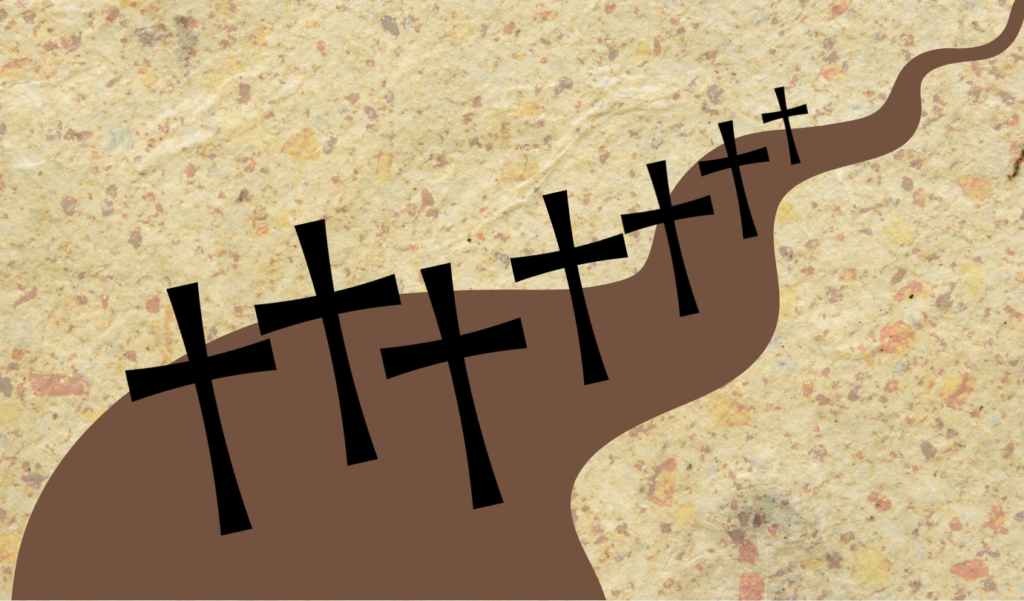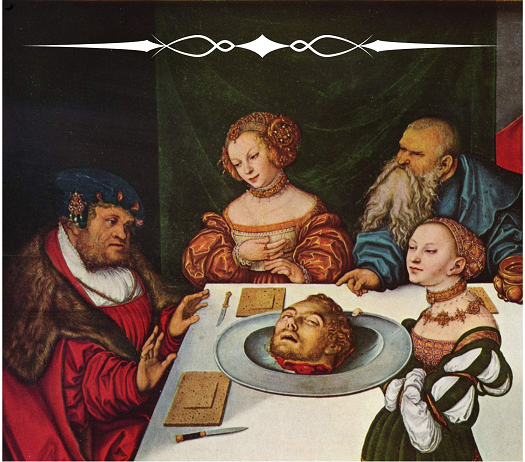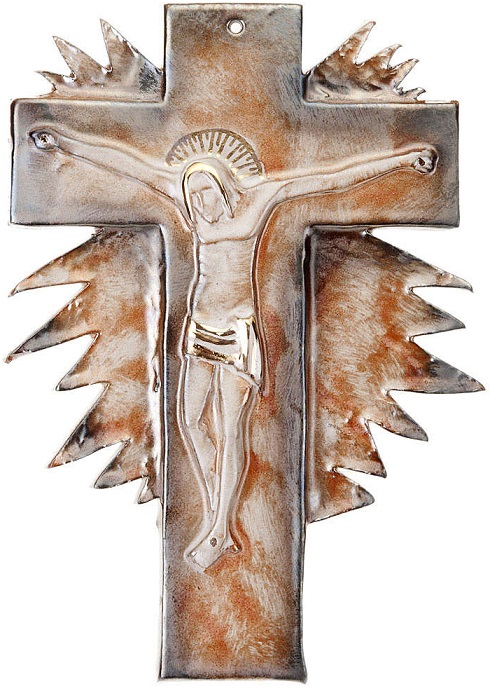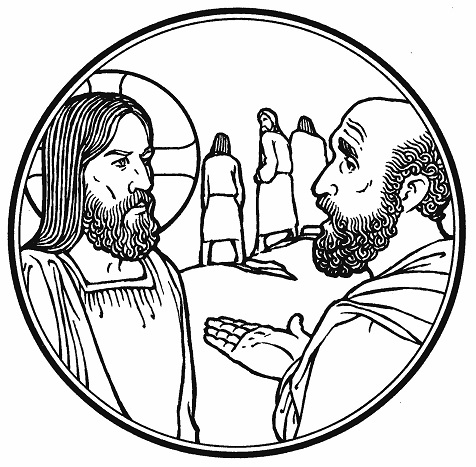Readings: Revelation 6:9–11 | Romans 6:1–5 | Mark 6:14–29
Text: Mark 6:14-29
“Martyrs for Marriage”
“Rescue me, O my God, from the hand of the wicked, from the grasp of the unjust and cruel man. For you, O Lord, are my hope, my trust, O Lord, from my youth.” ~ Psalm 71:4-5 ~
In the + Name of Jesus. Amen.
John was the forerunner to the Christ. He was born six months before, and He went before the Lord. He was a voice crying in the wilderness, “Prepare the way of the Lord, make his paths straight” (Mark 1:3, citing Isaiah 40:3) And that he did for all Judea and Jerusalem, who came out to be baptized by him in the river Jordan, confessing their sins. But the Mightier One came as John said, and has fulfilled all righteousness [Mark 1:4-8, Matt. 3:13-15], and indeed He is the righteousness, and sanctification, and redemption of all who believe [1 Cor. 1:30].

We are those who come after Christ. He tells us, “If anyone would come after me, let him deny himself and take up his cross and follow me.” and “Truly, I say to you, there is no one who has left house or brothers or sisters or mother or father or children or lands, for my sake and for the gospel, 30 who will not receive a hundredfold now in this time, houses and brothers and sisters and mothers and children and lands, with persecutions, and in the age to come eternal life.” (Mark 8:34; 10:29-30) But like John, we also sometimes must preach, one to another, God’s holy, unchangeable Law and then point repentant sinners to Christ.
John preached against so-called marriage which ran contrary to God’s Law. No matter what gifts were exchanged, political favors given, or how much Herod and Herodias felt love or lust for each other, it was not really marriage, and John said as much. Herod’s rank did not factor in. He was a human being, and humans are subject to the Law given by their Creator. This Law does not change depending on where you live, how much money you have, or what is socially acceptable, or even if you consider yourself a Christian.
Those who have the Word of God know what marriage is:
18 Then the Lord God said, “It is not good that the man should be alone; I will make him a helper fit for him.”…21 So the Lord God caused a deep sleep to fall upon the man, and while he slept took one of his ribs and closed up its place with flesh. 22 And the rib that the Lord God had taken from the man he made into a woman and brought her to the man. 23 Then the man said, “This at last is bone of my bones and flesh of my flesh; she shall be called Woman, because she was taken out of Man.” 24 Therefore a man shall leave his father and his mother and hold fast to his wife, and they shall become one flesh. 25 And the man and his wife were both naked and were not ashamed. (Genesis 2:18, 21-25)

And like was shared during the Catechism lesson, anything apart from this institution is not God’s intent for marriage. This holds true, even in the age of no-fault divorce, cohabitation, and pairings of all different kinds.
So, the people who have God’s Word believe that Word, and like John, we speak His truth to others. And like John, we don’t give preferential treatment with whom we speak this truth, whether it’s to those in authority, or those in our family. It may be to our children who put off marriage but not sleeping together, or to our parents who want to avoid the burdens of two becoming one financially and legally, or to our peers who want to divorce because they don’t feel fulfilled by their spouse anymore.
And also like John, the one who brings the Word of God may suffer personally for exposing that sin. It might mean at the very least awkward silences at dinner, alienation, or ridicule. For Christians in some positions it may mean losing your job, like Atlanta Fire Chief Kelvin Cochran[1] or having your business boycotted, as Dan Cathy of Chick-Fil-A. In recent years, it has also meant the presumably-legal attack on Christian businesses, such as Colorado cake artist Jack Phillips,[2] Washington florist Barronelle Stutzman,[3] and New Mexico photographer Elane Huguenin.[4] And this year, speaking this truth resulted in legal charges against the new Finnish Lutheran bishop Juhana Pohjola for a booklet he helped publish in 2004 which addressed legal and psychological effects of legalizing same-sex unions in Finland.[5]
With all that speaking the truth entails—even if it isn’t the shedding of your blood—Christians today are truly martyrs for marriage. Martyrs are those who witness for God. And those who are deluded in error want to silence the accusation which comes on our lips. But it isn’t for any personal pride or battle for conservative values that we speak. It is God’s love for wayward souls. God loved Herod Antipas, and Herodias, and Salome her daughter enough to speak to them.[6] God loves the homosexuals, the transexual, the spouses at odds with each other, the couples who move in together—enough to speak to them, and He is using His people to do that. In all likelihood, they won’t be coming here to hear this sermon, so it is laid on you to share the warning of the Law, “It is not lawful, and I care about not just your happiness, but your eternal welfare, to tell you this is not good.”

19 And Herodias had a grudge against [John] and wanted to put him to death. But she could not, 20 for Herod feared John, knowing that he was a righteous and holy man, and he kept him safe. When he heard him, he was greatly perplexed, and yet he heard him gladly. 21 But an opportunity came when Herod on his birthday gave a banquet for his nobles and military commanders and the leading men of Galilee.
And like Herod, the people we speak to will have a moment where they will have to respond to the truth of God’s Law and choose. Herod’s time of choice came when his pretend wife and her daughter asked for the head of John the Baptist. We hope for nothing so extreme, but when the moment of truth comes, it is our prayer that they would repent of their evil ways and turn to Christ, the Savior of sinners.
Even in John’s death, God’s will was done. Perhaps as John had been preaching, “His winnowing fork is in his hand, and he will clear his threshing floor and gather his wheat into the barn, but the chaff he will burn with unquenchable fire,” he had hoped this would mean immediate, visible victory over those who oppose the coming Messiah. But the Kingdom can still be resisted, and even if men and women reject its call to repent and believe, that doesn’t mean God’s Word has failed. Sure, Herodias was pretty smug that she had gotten her way and gotten rid of that trouble-maker. In the End, that is the Day of Judgement, God has the last word.
As we, the followers of Christ, are martyrs for marriage in our own time, it isn’t on us how people respond to the Word of God. Instead, our responsibility is to proclaim and uphold the unchanging truth of marriage—to, as St. Paul says, “shine as lights in the world…in the midst of a crooked and twisted generation” and in Hebrews it is written, “Let marriage be held in honor among all, and let the marriage bed be undefiled” (Phil. 3:15; Hebrews 13:4).

That brings its own challenges and pains, but amidst that, God’s blessing. For husbands and wives, it means humbly living out what we heard in the Epistle lesson from last Sunday (Ephesians 5:22-33). Wives are to submit to their own husbands, as the Church submits to Christ, her head. Husbands are to love their wives sacrificially as Christ loves the Church, forgiving her flaws, and caring and nurturing them as they would their own bodies. This is the will of God, even in difficult marriages, “10 To the married I give this charge (not I, but the Lord): the wife should not separate from her husband 11 (but if she does, she should remain unmarried or else be reconciled to her husband), and the husband should not divorce his wife.” (1 Cor. 7:10-11) and even if one spouse is not a believer, the life of the Christian is still a witness, as St. Peter says, “Likewise, wives, be subject to your own husbands, so that even if some do not obey the word, they may be won without a word by the conduct of their wives, 2 when they see your respectful and pure conduct.” (1 Pet. 3:1-2)
The burdens Christians face in marriage today are nothing new, but we are sorely tempted by human remedies. It’s hard to slog through day-to-day, year after year, with your spouse—their sins and your sins colliding. That’s why affairs look so appealing because you can have the “benefits” supposedly without the trouble. When we lose our patience, maybe divorce sounds appealing (kind of like suicide sounds like new hope to a depressed person). The thing that breaks marriages is not the world, but a selfishness that takes root in our hearts, that elevates our felt needs over that of the one whom God has given us as spouse. God sees through our hardness of heart and excuses. Infidelity and desertion are grounds for divorce, but through sharing the abundant grace of Christ, forgiveness and restoration may be possible. When there’s abuse, even a believer should seek safety and protect themselves and their children. Separation is often necessary (even retraining orders), but the advice of St. Paul is compelling: “12 To the rest I say (I, not the Lord) that if any brother has a wife who is an unbeliever, and she consents to live with him, he should not divorce her. 13 If any woman has a husband who is an unbeliever, and he consents to live with her, she should not divorce him… 15 But if the unbelieving partner separates, let it be so. In such cases the brother or sister is not enslaved. God has called you to peace. 16 For how do you know, wife, whether you will save your husband? Or how do you know, husband, whether you will save your wife?” (1 Cor. 12-13, 15) To God, the souls of both people are precious, even if sin has caused evil.

Widows and widowers, the Lord also shines through you as martyrs for marriage. Bearing the daily loneliness because death has separated you from your spouse, you set your hope on your God, who raised Jesus from the dead. St. Paul writes, “She who is truly a widow, left all alone, has set her hope on God and continues in supplications and prayers night and day,” and, “I would have younger widows marry, bear children, manage their households, and give the adversary no occasion for slander.” (1 Timothy 5:5, 14)
Likewise, those who are single support the body of Christ. St. Paul even commends this estate for those who are able to keep it chastely: “To the unmarried and the widows I say that it is good for them to remain single, as I am… 26 I think that in view of the present distress it is good for a person to remain as he is.” (1 Cor. 7:8, 26) You are spared the worldly troubles of marriage, but with the gift God has given you and the added time and material resources, serve Him and serve your married and widowed brothers and sisters.
All of this shows the burden and pain of taking up our cross as martyrs for Christ. We don’t ask for these crosses to bear, but we will not take the world’s answers—defining marriage according to lusts, casting it off when it doesn’t suit our fancy, and chasing after the carnal appetite rather than using our bodies to serve the Lord who bought us with the price of His blood. Following Jesus, these pains drive us to the cross where the Lord lifts up and restores our crushed spirit [Psalm 34:18-19]. He calls us to where the Father adopted us in the water of Baptism, to confess our sins and believe the word of Absolution He puts on our pastor’s lips, to eat and drink Jesus’ Body and Blood for the forgiveness of our sins.
It’s nothing new that people hide from God’s Law, but He has been seeking out sinners since the first disobedience. He has sought and found you and me, and by His grace may we not fall into temptation, so that we can live godly lives in the presence of God and our neighbors.
In light of the fact that for health concerns, we are refraining from Holy Communion today, let us turn to the order of Individual Confession and Absolution on page 292 in the hymnal.
…
In the Name of the Father and of the + Son and of the Holy Spirit. Amen.

[1] https://adflegal.org/case/cochran-v-city-atlanta
[2] https://adflegal.org/blog/after-8-years-legal-battles-and-2-wins-jack-phillips-still-being-sued
[3] https://adflegal.org/case/arlenes-flowers-v-state-washington
[4] https://adflegal.org/case/elane-photography-v-willock
[5] https://ilc-online.org/2021/04/30/finnish-bishop-elect-charged-over-historic-christian-teachings-on-human-sexuality/ and https://www.washingtontimes.com/news/2021/aug/6/christian-member-finnish-parliament-faces-prison-q/
https://lhpk.fi/wp-content/uploads/2019/12/Male-and-female-He-created-them.pdf
[6] We learn of Herodias’ daughter’s name from the 4th century church historian Eusebius.

























